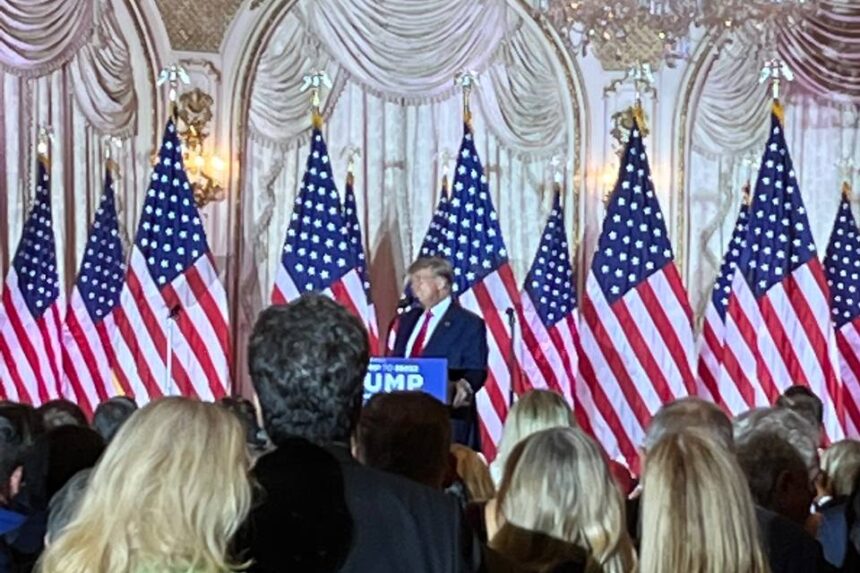I watched the lights dotting the Spanish-Moorish silhouette of Mar-a-Lago dance in the night waters of Palm Beach as I crossed the main bridge to Donald Trump’s Winter Palace in Florida. My Uber was greeted on the other side by cheering fans waving patriotic signs. A box truck modified with screens displaying images of the American flag and Trump drove around playing “God Bless the U.S.A.,” by Lee Greenwood. “Jesus is my savior. Trump is my president,” one screen read. That evening, Trump would announce a White House bid for 2024.
The former and perhaps future president sauntered into the gilded, palatial grand ballroom to the roar of a crowd of supporters. “Do You Hear the People Sing?” from Les Misérables, had blared through the room just moments before. Trump’s tone and tenor were disciplined and sober but optimistic. He did not, as some expected he might, hurl furious thunderbolts at potential challengers, such as Gov. Ron DeSantis. Instead, his speech reflected on past achievements, pondered present woes, and promised a future of “national greatness” realized. “The journey ahead of us will not be easy,” Trump said. “Anyone who truly seeks to take on this rigged and corrupt system will be faced with a storm of fire that only a few could understand.”
There were many moments when the crowd would interject with cheers and applause at something he said, but when Trump declared, “we built the wall” and “we completed the wall,” referring to the U.S.-Mexico barrier, the applause was awkwardly absent. That wall is still unfinished.
And when Trump talked about getting tough on drug traffickers, especially foreign nationals, I was reminded that the First Step Act contained a provision to shorten mandatory minimums for those caught smuggling drugs into the U.S. by sea.
At times, Trump doubled down on things that are unpopular with his base, like his response to COVID-19, which he presented as wholly positive. Nor was there any mention of a different approach to personnel for a second administration. Even Trump’s most diehard supporters acknowledge that this problem plagued the administration and the 2020 campaign.
The crowd did not linger long after he concluded his remarks, which were generally well-received. But substantively, the speech left me with questions about what Trump has learned from the past—because that will ultimately determine his future.
Certainly, one could argue that it wouldn’t make sense for Trump to admit, for example, that he has regrets over COVID-19 or over criminal justice reform—but there is no other way of knowing whether he has learned and evolved as an executive. And in the end, it is that kind of growth that would make all the difference.
Because if Trump somehow manages to land in the White House once more, there will be no room for error the second time around, no excuse for the ideological inconsistencies that undermined his first term. In order to face the greatly increased challenges of a second term, Trump would have to show a degree of personal and executive discipline we have not yet seen.
—Pedro Gonzalez

Leave a Reply